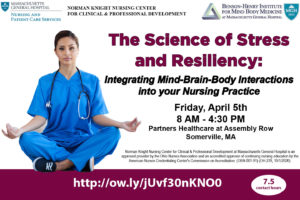1-Day Mind Body Nursing CME – April 5th
resilience
1-Day Mind Body Nursing CME – April 5th
The Benson-Henry Institute for Mind Body Medicine (BHI) is pleased to invite nurses and healthcare clinicians to its upcoming continuing medical education program, The Science of Stress and Resiliency: Integrating Mind-Brain-Body Interactions into your Nursing Practice.
The program is offered under the auspices of the Norman Knight Nursing Center for Clinical & Professional Development at Massachusetts General Hospital and will be held Friday, April 5th from 8 AM to 4:30 PM at Partners Healthcare at Assembly Row, Somerville.
Daily exposure to stress and shift work are two common features of nursing practice that, if left unchecked, compromise health and increase vulnerability to provider burnout.
Through advances in technology and bioscience, greater understanding of the body’s regulatory systems is now understood to involve mind-brain-body interactions and circadian rhythms that are modified by lifestyle behaviors. Learning how to modify behavior in support of these key regulatory systems increases health and resiliency. Conversely, lack of knowledge and failure to adhere to these behaviors disrupts key regulatory pathways, resulting in greater vulnerability to specific diseases and symptomatology.
This course an excellent opportunity for nurses to learn how both stress and circadian systems affect the brain and body and to develop self-care skills they can teach patients and utilize themselves. Participants will hear the latest research into the science of stress and how it affects the body at the genomic level, understand how lifestyle behaviors and the timing of these behaviors can positively impact health outcomes and build resiliency, build skills in meditation, stand cognitive reappraisal and take part in mind body practices like yoga.
Speakers include BHI’s Clinical Director of Training, Peg Baim, MS, ANP; BHI’s Director of Research, John W. Denninger, MD, PhD; Laura Malloy, LICSW, RYT, Director of Yoga Programs at BHI; Katherine Rosa, PhD, FNP, Co-Director of the BHI Stress Management and Resiliency Training (SMART) program; and Boston-area nursing leaders Patricia Martin Arcari, PhD, RN, AHN-BC, Program Manager for Meditation and Mindfulness at the Zakim Center at Dana Farber Cancer Institute and Joanne Rowley, RN, MS, HNB-BC, Clinical Nurse Specialist and Holistic Nurse at MGH Revere.

Participation in the course can be applied toward the BHI’s Stress Management and Resiliency Training (SMART) Certification for Healthcare Practitioners program. https://bensonhenryinstitute.org/
For more information or to register, visit http://ow.ly/jUvf30nKNO0 or email jmeek@partners.org.
The Norman Knight Nursing Center for Clinical & Professional Development at Massachusetts General Hospital is an approved provider by the Ohio Nurses Association an accredited approver of continuing nursing education by the American Nurses Credentialing Center’s Commission on Accreditation. (OBN-001-91). The Knight Center has approved 7.5 contact hours.
Criteria for successful completion include: electronic check-in or paper sign-in at the beginning of the program, attendance at the entire event and submission of a completed evaluation.
There is no conflict of interest for anyone in a position to control the content of this activity.
Ramp up your resilience
By Harvard Health Publishing
The ability to bounce back from stress or adversity is important throughout life, especially in our older years. That’s when we face many transitions, such as health problems; job, income, and home changes; the loss of loved ones; and isolation or separation from friends, grown children, and grandchildren. How we adjust to these changes helps determine what life will look like moving forward. “Many people are living longer, and we want to make the most of these years so people can thrive,” says Laura Malloy, the Successful Aging program director at the Harvard-affiliated Benson-Henry Institute for Mind Body Medicine.
The benefits of resilience
Coping with stress in a positive way is known as resilience, and it has many health benefits. It’s associated with longevity, lower rates of depression, and greater satisfaction with life. “There’s a sense of control, and it helps people feel more positive in general,” Malloy says.
Likewise, a lack of resilience means that you may not handle stress well in difficult situations. Chronic stress is associated with harmful health consequences such as high blood pressure, a weakened immune system, anxiety, depression, insomnia, heartburn, indigestion, and heart disease
Click HERE to read the full article



